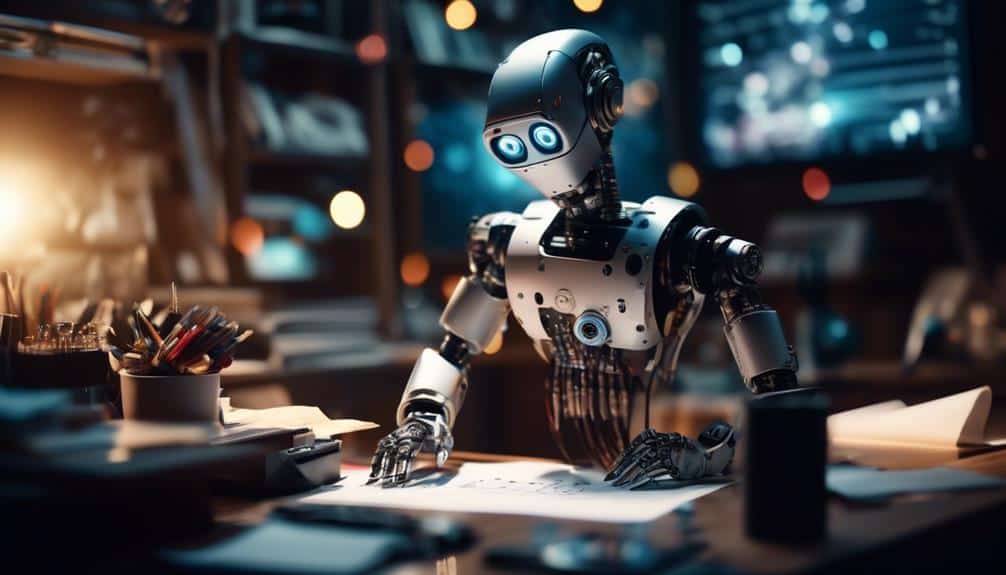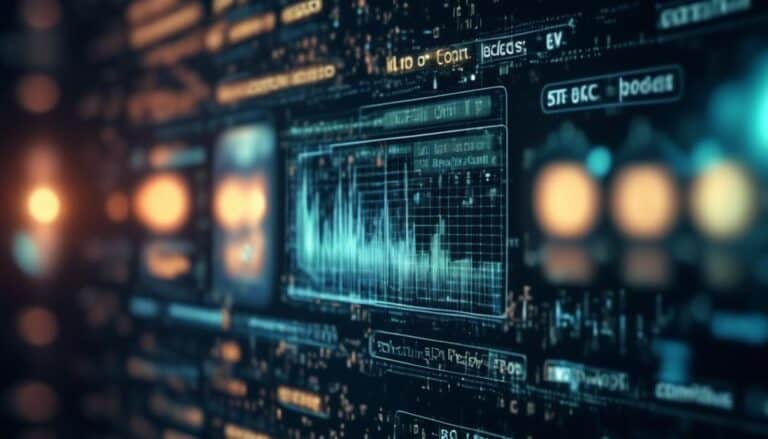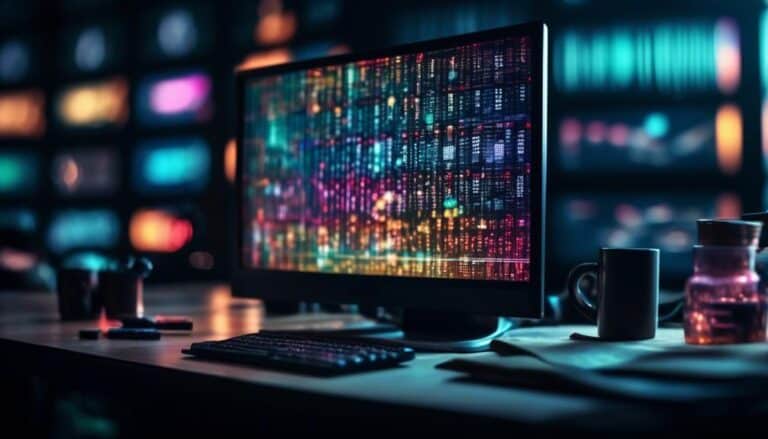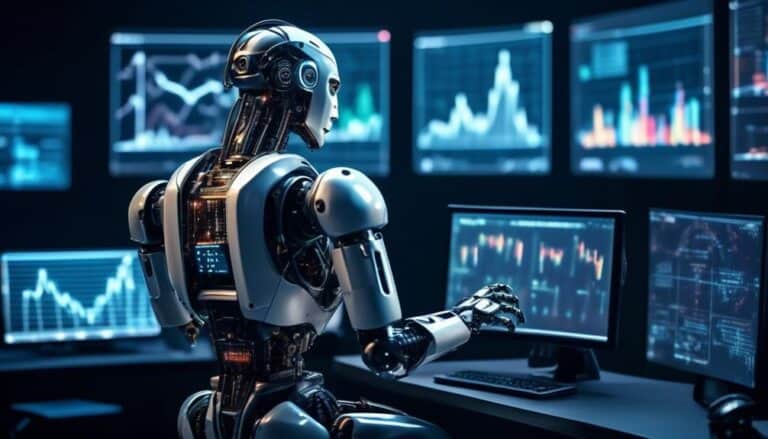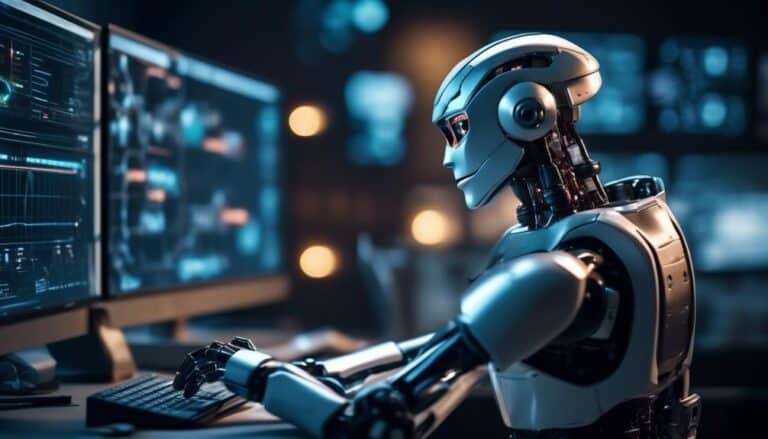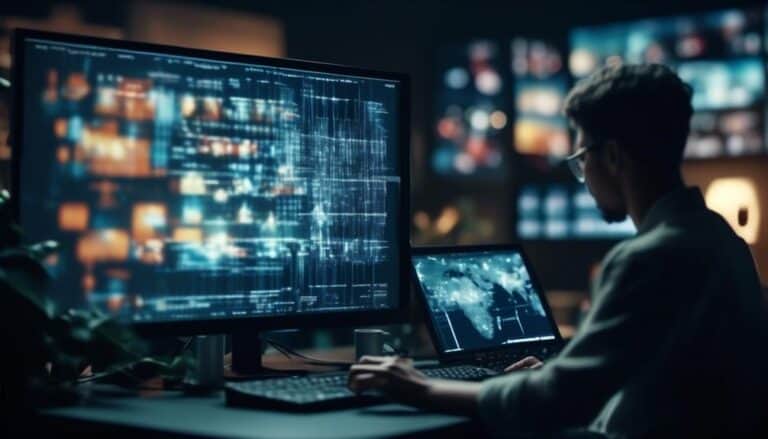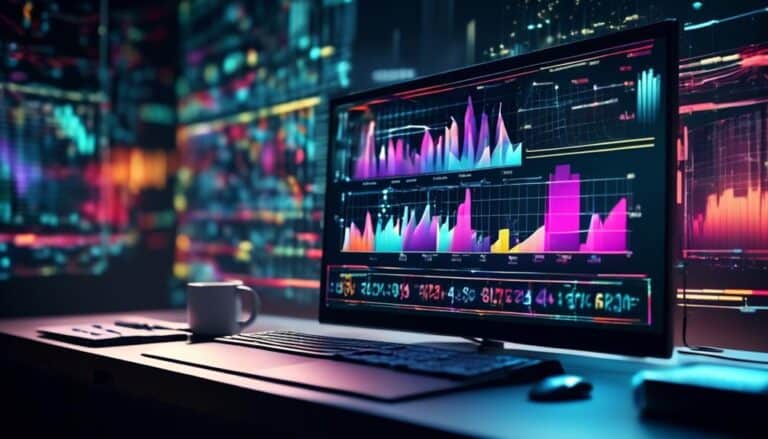From Creation to Compliance: Copyright Laws Impacting AI-Generated Works
When it comes to the realm of creative expression, the intersection of artificial intelligence and copyright laws forms a complex web of challenges and opportunities.
As you navigate the landscape of AI-generated works, the intricacies of ownership, protection, and ethical considerations come into play, shaping the future of intellectual property rights.
Explore with us the delicate balance between innovation and regulation in this evolving arena, where the boundaries of creativity and compliance blur, paving the way for a thought-provoking exploration of the implications at hand.
Key Takeaways
- Determining ownership rights in AI-generated works can be complex and may require new legal frameworks to address the nuances of authorship and ownership.
- Ethical considerations play a significant role in AI content rights, requiring transparency, fairness, and accountability in decision-making processes.
- International copyright standards and licensing need to evolve to accommodate the global impact of AI on intellectual property, requiring harmonization and cross-border enforcement mechanisms.
- Balancing copyright protection with creative expression in AI content is crucial for fostering innovation while ensuring fair compensation for creators.
Evolution of AI in Copyright
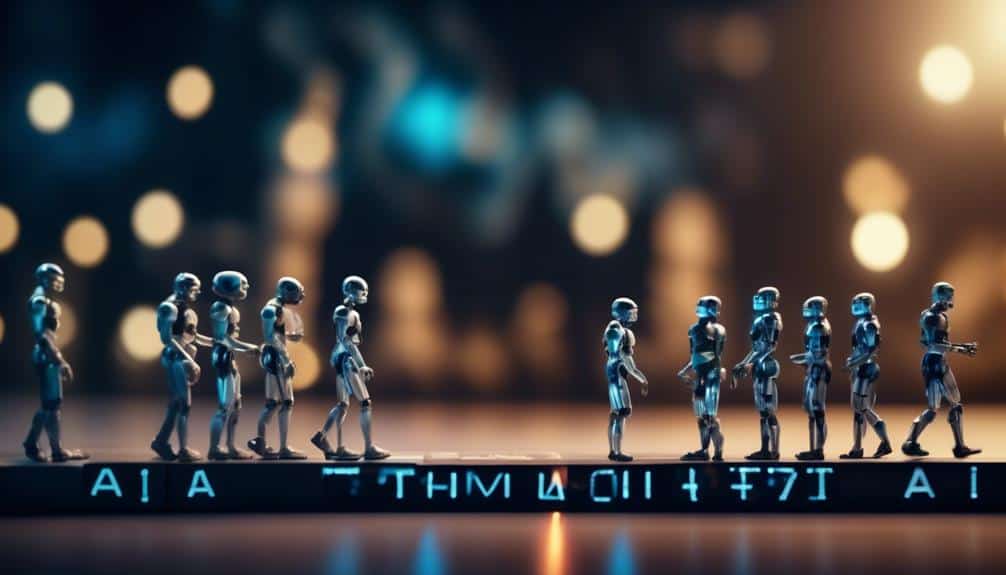
As AI technology continues to advance rapidly, its integration into the realm of copyright law has sparked significant debates and challenges. The evolution of AI in copyright has brought about profound implications for intellectual property rights. Technological advancements in copyright have led to questions regarding the ownership of AI-generated works. The traditional understanding of copyright, which revolves around human creators, is being reshaped by the capabilities of AI to produce original content.
AI copyright implications extend to issues of authorship and ownership. The question of who should hold the rights to AI-generated creations remains a contentious topic. Some argue that the programmers or organizations behind the AI should be considered the rightful owners, while others advocate for a more flexible approach that considers a collaborative ownership involving both AI systems and human creators.
Furthermore, the use of AI in creating works that closely resemble existing copyrighted material raises concerns about infringement and fair use. As AI continues to evolve and produce increasingly sophisticated works, the need for clear guidelines and regulations in the realm of AI-generated content becomes more pressing.
Ownership of AI-Generated Content
When it comes to ownership of AI-generated content, understanding the nuances of AI content rights and legal AI attribution is crucial.
You need to consider who holds the rights to content created by AI systems and how to properly attribute authorship in a legal context.
These points delve into the complexities surrounding the ownership of AI-generated works and the implications for copyright laws.
AI Content Rights
The ownership of AI-generated content is a complex legal issue that requires careful consideration of copyright laws and intellectual property rights. When it comes to AI content rights, ethical considerations play a significant role in determining ownership rights.
While AI technology can autonomously generate content, questions arise regarding who holds the rights to these creations. Some argue that the developers or organizations that created the AI should own the content, while others believe that the AI itself should be granted some form of ownership.
Balancing these ethical considerations with existing copyright laws poses a challenge, as current regulations may not fully address the nuances of AI-generated works. As the field continues to evolve, finding a fair and just framework for AI content rights remains a pressing concern.
Legal AI Attribution
Exploring the complexities of determining ownership rights for AI-generated content involves navigating a landscape shaped by evolving copyright laws and ethical considerations. When delving into legal AI attribution, one encounters a myriad of challenges that have significant legal implications:
- Moral Dilemmas: The attribution challenges surrounding AI-generated works raise ethical questions about the rights of creators versus the autonomy of machines, sparking debates on where ownership truly lies.
- Regulatory Ambiguity: The legal framework for attributing AI-generated content is still murky, leading to uncertainties in determining who holds the rights to these works and how to enforce them effectively.
- Industry Disputes: The lack of clear guidelines often results in disputes among stakeholders, highlighting the urgent need for comprehensive regulations to address ownership issues in the realm of AI-generated creations.
Copyright Protection Challenges
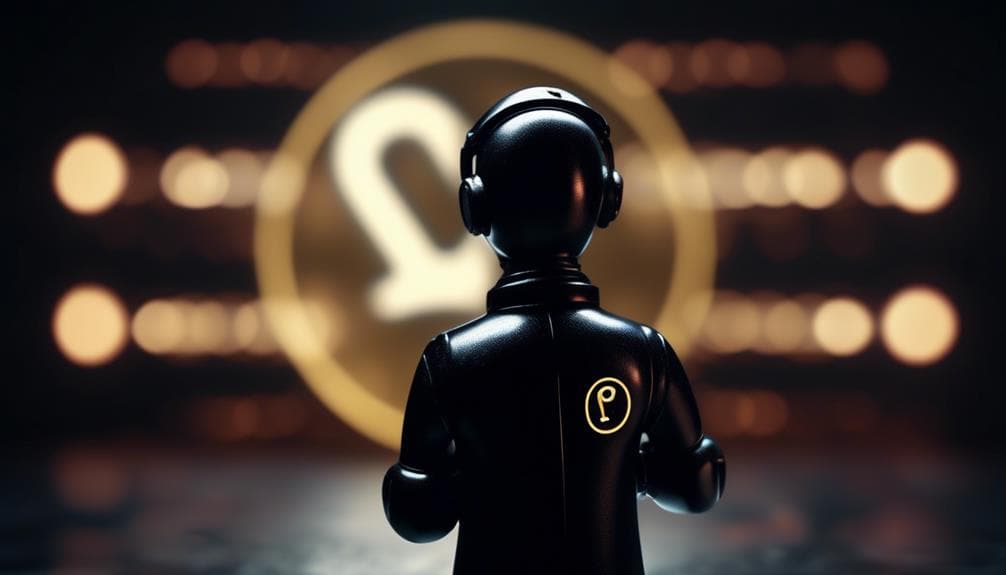
Navigating the complex landscape of copyright protection for AI-generated works presents a myriad of challenges that require careful consideration and strategic solutions. One of the primary challenges is determining the eligibility of AI-generated content for copyright protection. As AI evolves to produce more sophisticated works, questions arise regarding the originality and creativity standards necessary for copyright. Additionally, identifying the proper ownership of AI-generated works poses a significant challenge, especially when multiple parties are involved in the creation process. This leads to implications on rights enforcement and fair compensation for creators.
| Challenges | Implications | Solutions |
|---|---|---|
| Determining copyright eligibility | Uncertainty in protection status | Establish clear guidelines |
| Ownership rights of AI-generated works | Legal disputes and ambiguity | Define ownership criteria |
| Enforcement of rights in AI-created content | Difficulty in regulating and enforcing | Implement AI-specific laws |
Fair Use Considerations
Consider the nuanced realm of fair use when pondering AI-generated works. It requires a delicate balance between transformative use and the original creator's rights. Legal boundaries can blur in these instances, necessitating a rigorous analysis of each unique situation to determine the extent of fair use.
Understanding the intricacies of fair use considerations is crucial to navigating the evolving landscape of AI-generated content within the framework of copyright laws.
Fair Use Analysis
When determining fair use in the context of AI-generated works, it's essential to carefully assess the purpose and character of the use, the nature of the copyrighted work, the amount and substantiality of the portion used, and the potential market impact. Considering these factors is crucial in determining whether the use qualifies as fair under copyright law.
Emotional Impact List:
- Concern: Will the AI-generated work harm the market value of the original creation?
- Empathy: Put yourself in the shoes of the original creator; how would you feel if your work was used in this manner?
- Responsibility: Acknowledge the importance of respecting intellectual property rights even in the age of AI.
Legal Boundaries
Exploring the legal boundaries surrounding fair use considerations requires a nuanced understanding of how copyright law intersects with AI-generated works. When it comes to AI-generated content, ethical considerations and ownership disputes often arise, challenging traditional copyright norms. In the context of fair use, determining the transformative nature of the AI-generated work and its impact on the market value of the original work becomes crucial. Below is a table summarizing key aspects to consider when evaluating fair use in AI-generated works:
| Consideration | Description | Importance |
|---|---|---|
| Transformative Purpose | Assess if the AI work adds new expression, meaning, or message to the original content. | High |
| Nature of the Work | Consider the original work's creativity level and if it is factual or fictional. | Medium |
| Effect on Market Value | Evaluate if the AI work affects the market potential or value of the original content. | High |
| Amount Used | Determine the proportion of the original work used in the AI-generated creation. | Medium |
| Ethical Implications | Reflect on the ethical considerations involved in using AI to generate copyrighted works. | High |
Creative Collaboration With AI
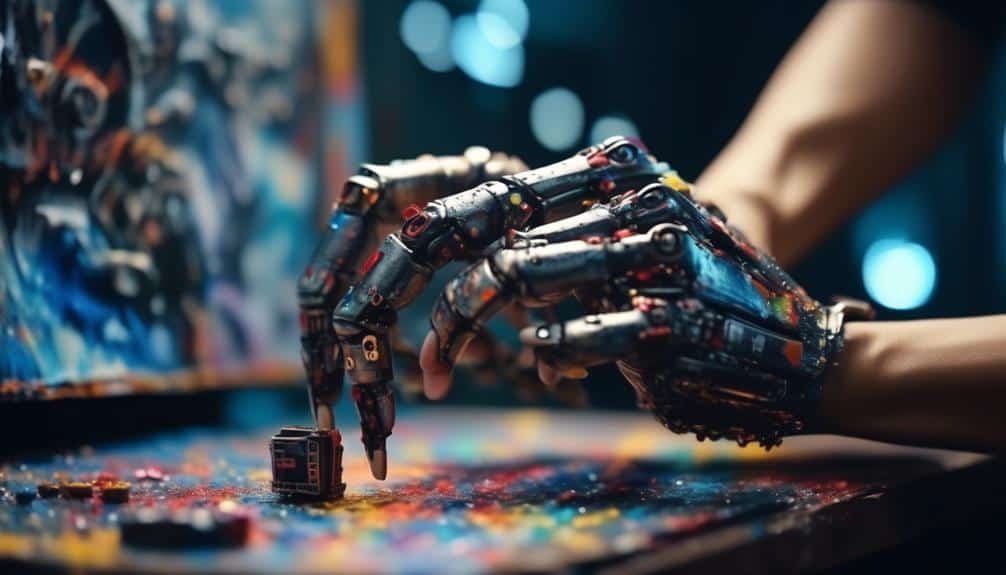
In the realm of creative collaboration with AI, navigating the complexities of authorship and ownership becomes a critical aspect for creators and innovators. When delving into collaborative possibilities and innovative intersections with artificial intelligence, several key considerations come into play:
- Ethical Dilemmas: The ethical implications of AI involvement in the creative process can raise concerns about authenticity and the essence of human creativity. Balancing the contributions of AI with human input is crucial to maintain integrity and originality in collaborative works.
- Legal Framework: Understanding the legal framework surrounding AI-generated content is essential to determine ownership rights and responsibilities. Clarifying agreements and contracts to define the roles and rights of both human creators and AI systems is vital for smooth collaboration.
- Innovation Impact: Exploring the impact of AI on innovation in creative fields highlights the potential for groundbreaking creations but also underscores the need for clear guidelines to navigate the evolving landscape of AI-generated works. Striking a balance between harnessing AI's capabilities and preserving the essence of human creativity is key to fostering fruitful collaborative endeavors.
Legal Precedents and Cases
Legal precedents and cases provide valuable insights into the evolving landscape of AI-generated works, shedding light on pivotal decisions that shape the intersection of copyright laws and artificial intelligence. Court rulings in cases involving AI-generated works have significant legal implications, setting the tone for how copyright laws apply to creations produced by artificial intelligence.
One such notable case is the Naruto v. Slater litigation, where a monkey named Naruto took a selfie using a photographer's camera. The court ultimately ruled that animals can't own copyrights, raising questions about the copyright ownership of AI-generated works. This case highlighted the need for clarity in copyright laws regarding non-human creators.
Additionally, the landmark decision in the Warner Bros. v. RDR Books case addressed the transformative nature of AI-generated works. The court ruled in favor of fair use when a fan-made Harry Potter lexicon was created using AI, showcasing the balancing act between copyright protection and creative expression in AI-generated content. These court rulings set important precedents for future cases involving AI-generated works and copyright law.
International Copyright Standards
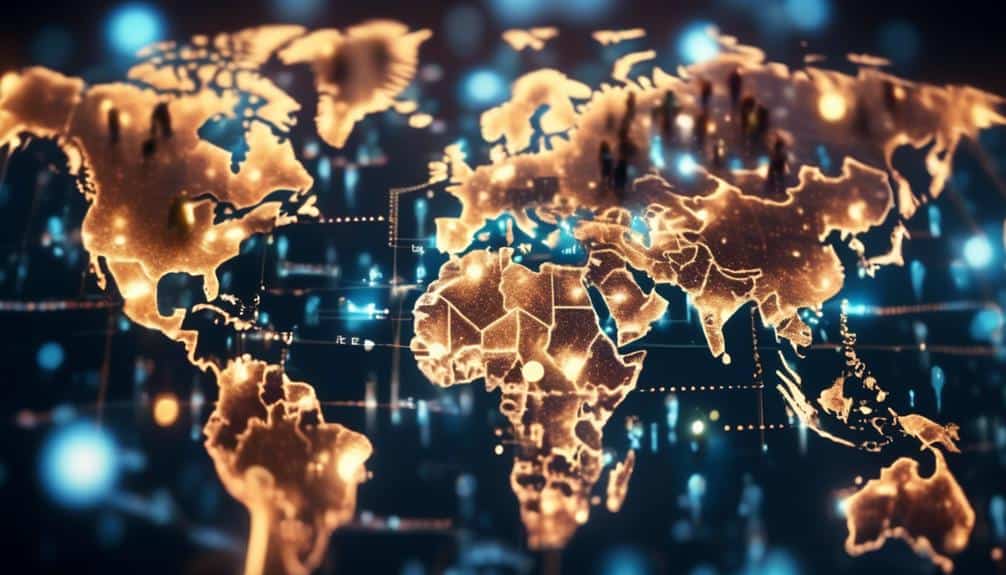
International copyright standards play a crucial role in shaping the protection and enforcement of intellectual property rights across borders. When it comes to international cooperation in copyright matters, harmonizing laws and regulations among countries can facilitate smoother cross-border transactions and foster a more unified approach to intellectual property protection. Additionally, the establishment of consistent cross-border enforcement mechanisms helps in deterring copyright infringement on a global scale, ensuring that creators' rights are respected worldwide.
Emotional List:
- Frustration: Discovering inconsistencies in copyright laws between different countries can be frustrating for creators seeking to protect their works internationally.
- Empowerment: Knowing that there are international copyright standards in place can empower creators to share their works with a broader audience without fear of infringement.
- Unity: International copyright standards promote a sense of unity among nations, emphasizing the importance of respecting intellectual property rights globally.
Licensing and Monetization Strategies
When considering licensing strategies for AI-generated works, it's crucial to analyze the various options available to effectively monetize these creations.
By understanding the nuances of licensing agreements and exploring different monetization avenues, you can maximize the value derived from AI-generated content.
This strategic approach ensures that creators and businesses can navigate the complexities of copyright laws to benefit from their AI-generated works.
Licensing Strategies Overview
Crafting a strategic licensing approach is essential for effectively monetizing AI-generated works.
When delving into licensing negotiations, consider implementing dynamic pricing strategies to adapt to market trends. Explore innovative royalty distribution models that prioritize fair compensation for all parties involved.
Additionally, delve into revenue sharing agreements that foster collaboration and incentivize continued creation. Embracing transparent and flexible licensing structures can pave the way for sustainable revenue streams and mutually beneficial partnerships.
Monetization Options Analysis
To effectively monetize AI-generated works, it's crucial to carefully analyze various monetization options and develop strategic licensing and monetization strategies.
When assessing the commercial viability of AI-generated content, consider licensing agreements that allow for revenue generation through royalties, flat fees, or subscription models. Evaluate the market demand for the AI-generated works and tailor licensing strategies to maximize revenue potential.
Additionally, explore partnerships with platforms or businesses that can help promote and distribute the content to reach a wider audience and increase monetization opportunities.
Ethical Implications in AI Creations
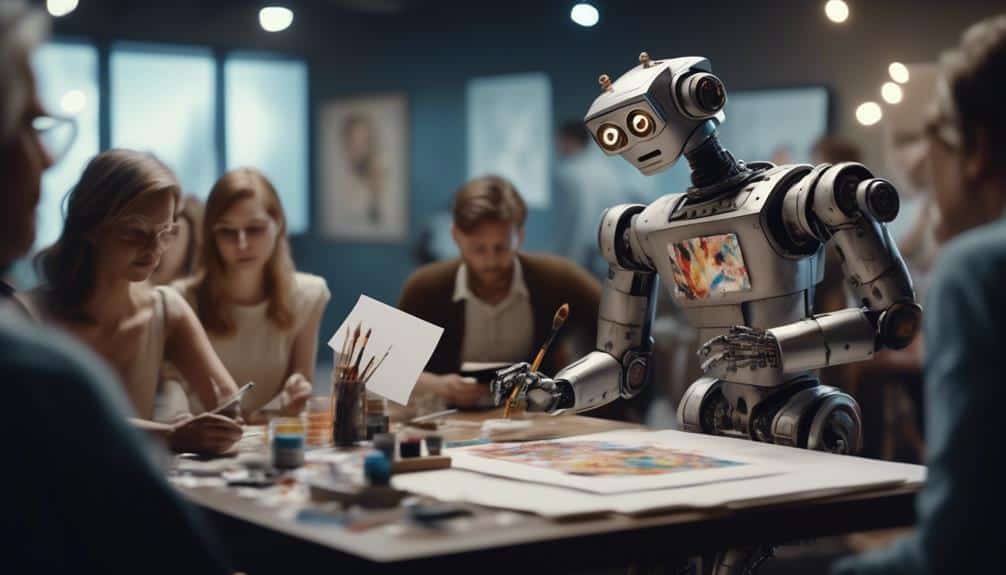
Exploring the ethical implications of AI creations sheds light on the complex intersection of technology and moral decision-making in the modern age. When delving into this realm, consider the following:
- Loss of Human Control: As AI becomes more advanced, the potential arises for machines to autonomously create content. This raises questions about who should bear responsibility for the ethical implications of AI-generated works.
- Bias and Discrimination: AI systems may inadvertently perpetuate or even exacerbate existing biases present in society. Understanding how to mitigate these biases and ensure fairness in AI creations is crucial for responsible innovation.
- Transparency and Accountability: Ensuring that the decision-making processes of AI systems are transparent and accountable is essential for addressing ethical considerations. Establishing clear guidelines for how AI creations are produced and monitored can help uphold ethical standards in this evolving landscape.
Future Trends and Regulations
When considering future trends and regulations in the realm of AI creations, one must anticipate a shift towards more stringent guidelines to address emerging ethical concerns. Regulatory implications are becoming increasingly crucial as technological advancements outpace current laws. Policy developments will likely focus on clarifying ownership rights, liability, and fair use standards for AI-generated works. Industry implications are also significant, with sectors such as healthcare, finance, and entertainment exploring how AI's creative capabilities intersect with copyright laws.
| Regulatory Implications | Technological Advancements | Policy Developments |
|---|---|---|
| Enhanced data privacy laws | Continued improvements in AI algorithms | Clearer guidelines on AI-generated content |
| Stricter copyright enforcement | Integration of AI with blockchain technology | Collaborative efforts between governments and tech companies |
| Ethical frameworks for AI use | Development of AI that can self-regulate | International standards for AI copyrights |
| Liability frameworks for AI errors | Expansion of AI into various industries | Mechanisms for resolving disputes involving AI creations |
| Transparency requirements for AI systems | Advancements in machine learning techniques | Incentives for creators of AI-generated works |
Frequently Asked Questions
How Can Ai-Generated Works Be Attributed to Their Creators in Copyright Law?
When dealing with AI-generated works, attribution challenges arise regarding determining creators. Legal protections must adapt to ensure rightful recognition and ownership. AI's impact on copyright law necessitates clear guidelines for identifying creators.
What Are the Implications of Ai-Generated Content on Traditional Notions of Authorship and Creativity?
When considering AI-generated content, ethical implications arise regarding authorship challenges. The traditional notions of creativity and ownership are being redefined. Understanding the impact of AI on authorship and creativity is crucial in navigating future copyright laws.
How Do Copyright Laws Address the Potential for AI to Create Works That Infringe on Existing Intellectual Property Rights?
Copyright laws address the potential for AI to create works that infringe on existing intellectual property rights by establishing guidelines for ownership and protection. Understanding these laws is crucial to navigating AI infringement concerns effectively.
Can Ai-Generated Works Be Considered Fair Use Under Copyright Law?
When considering AI-generated works and fair use analysis, it's essential to assess the transformative nature and purpose of the creation. Copyright ownership of AI creations may raise questions about the boundaries of fair use.
What Ethical Considerations Arise When Collaborating With AI in Creative Projects, and How Are These Addressed in Copyright Law?
When collaborating with AI in creative projects, ethical considerations regarding authorship and attribution challenges often arise. Copyright law addresses these by requiring clear guidelines on ownership and proper attribution to ensure fair recognition.
Conclusion
In conclusion, navigating the intersection of copyright laws and AI-generated works requires a nuanced understanding of ownership, protection, and ethical considerations.
As technology continues to advance, it's crucial for creators, businesses, and policymakers to adapt to evolving standards and regulations.
By addressing challenges such as fair use, licensing strategies, and international standards, stakeholders can foster innovation while upholding intellectual property rights in the digital age.
Stay informed and proactive in shaping the future of AI creativity within the bounds of copyright compliance.
